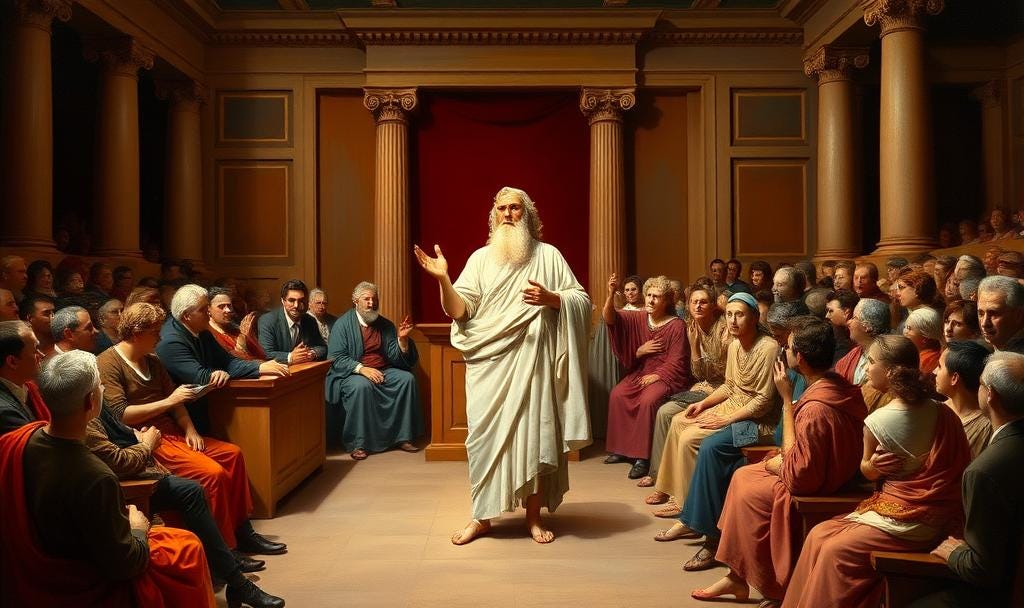"Socrates: The Man Who Challenged Athens and Won History"
"How Athens silenced its greatest thinker, only to immortalize him forever."
In the dim prison cell, surrounded by his family and devoted disciples, Socrates, the great philosopher of Athens, awaited his final moments. He was to be executed that evening, a punishment decided by the laws of the time. Despite the grim circumstances, the air was charged not with fear, but with an eerie calm emanating from the man himself.
In the dim prison cell, surrounded by his family and devoted disciples, Socrates, the great philosopher of Athens, awaited his final moments. He was to be executed that evening, a punishment decided by the laws of the time. Despite the grim circumstances, the air was charged not with fear, but with an eerie calm emanating from the man himself.
A Life on Trial
Socrates was accused of dissenting against the gods, conspiring against the state, and corrupting the youth with his teachings. His trial, held in an open field, was overseen by 500 judges, many of whom were aligned with the King of Greece and envious of Socrates’ influence, particularly among the youth. Despite the baseless charges, Socrates could have saved himself by appeasing the judges.
But that was not his way. Standing on trial, he boldly defended himself, challenging the judges with unrelenting questions and irrefutable arguments. His sharp wit and refusal to grovel only angered them further, sealing his fate.
The Month Before the End
Imprisoned for a month before his execution, Socrates left an indelible impression on everyone he encountered, even the prison guards. They admired his intellect so much that they secretly offered to help him escape. Yet, Socrates declined.
“History would remember me as a coward,” he said. “A heroic death is far better than a life of dishonor.”
The Final Act
When the executioner entered with the cup of hemlock poison, Socrates, calm as ever, asked, “What must I do?” He was instructed to drink every last drop. Without hesitation, he drained the bitter cup as if it were water.
As the poison began to take effect, the executioner ordered him to walk, accelerating the poison’s spread through his body. His disciples, weeping uncontrollably, watched as Socrates stood on trembling legs, smiled faintly, and obeyed. “I have obeyed the law all my life,” he said. “Why break it in death?”
Eventually, he lay down and, with remarkable composure, instructed his disciples not to cry aloud. “Let me die in peace,” he whispered. Even the executioner, hardened by his grim duties, bowed his head in shame and respect.
The Aftermath
The news of Socrates’ unjust execution spread like wildfire across Athens. Outraged citizens took to the streets, and many of the judges who had condemned him met grim fates—some were beaten to death by mobs, others took their own lives out of guilt.
Socrates’ death may have been a travesty, but it failed to silence his voice. His disciple Plato immortalized him through The Republic, a work that would shape philosophical thought for millennia. Plato’s own disciple, Aristotle, carried the torch forward, becoming a towering figure in philosophy and teaching none other than Alexander the Great.
An Eternal Legacy
Though Socrates died in what many consider a farce, his teachings and philosophy continue to inspire. Death could not extinguish the light of his wisdom. Instead, it ignited a flame that burns brightly in the annals of history, proving that the pursuit of truth and honor transcends mortality.












